Index.hr reports that the first two cases of the South African COVID-19 variant in Croatia have been confirmed, and there has also been an increase in the number of people infected with the UK variant of the virus.
Epidemiologist of the Croatian Institute of Public Health, Goranka Petrović, confirmed the news for N1.
“Yesterday, we received the results of sequencing those samples that we sent to the European Center for Disease Control. Of the 300 samples whose results arrived, 60 were positive for the UK variant, or 20% of the positive samples. That’s a pretty big percentage. The South African variant was also confirmed in two people who returned from Africa, from Zanzibar,” explained Petrović.
“According to the existing data, I would say that the UK variant is spreading faster, they say up to 50%. In this variant, it has not been confirmed that it avoids the immune response to that extent, which is the case in the South African variant. Namely, in the South African variant, it has been noticed that some mutations increase the probability of avoiding the immune response, whether the effectiveness is partially or significantly reduced to vaccination or that people who once had Covid can now be susceptible to reinfection,” said Petrović.
She added that vaccine manufacturers are also closely monitoring the emergence of new COVID-19 variants.
“The results of the research showed that both Pfizer and Moderna vaccines, and especially AstraZeneca, have poorer efficacy on the South African variant, and they are considering in which direction to modify their vaccines. It is to be assumed that this should be a relatively easy way to adapt, but it also requires a change in production,” said Petrović.
The epidemiologist stated that it is still unknown whether people will need to be re-vaccinated against COVID-19. She pointed out that the goal now is to vaccinate as many people as possible, especially because of the new variants.
“When we talk about new variants, there are many because it mutates, especially now that it is in a much less hospitable environment. A year ago, the population was very susceptible because it was not in contact with the virus. However, a year has passed, and people have managed to create some protection, and of course, it is also trying to adapt to that because it wants to survive. That is the reason why as many people as possible should be vaccinated as soon as possible,” explained Petrović.
She added that the new variants are a cause for concern because they have some characteristics that may change the pandemic’s course.
“They spread easier and faster, so they can increase the number of hospitalizations and deaths, burden the health care system. There are also some indications that the UK strain could cause a somewhat more severe clinical picture, but that has not been confirmed yet,” Petrović explained.
Commenting on the slight increase in the number of newly infected, Petrović stated that people had relaxed a bit and rooms are not ventilated. In some cases, people conceal close contacts. Petrović also said it was still difficult to say whether the increase was actually an indication of a third wave.
“It takes another 14 days to see if this is something we have under control or if it requires some additional measures. It is too early to say whether this is the third wave, but given the knowledge that we have 20% positive for the UK variant, we should be cautious,” said Petrović.
As Index unofficially found out, Croatia has 520 new cases today, and about 6000 people have been tested.
To read more about COVID-19 in Croatia, follow TCN’s dedicated page.









